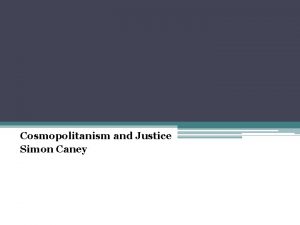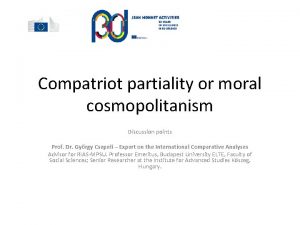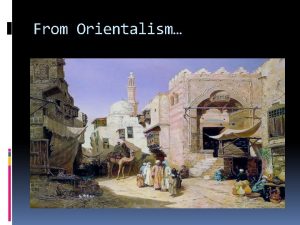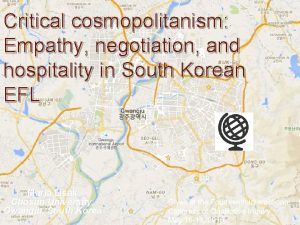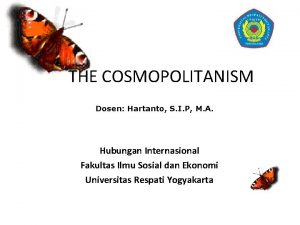Cosmopolitanism and Justice Simon Caney The world is




























- Slides: 28

Cosmopolitanism and Justice Simon Caney

• The world is characterized by extensive global poverty and marked inequalities, environmental problem that interest many • These phenomena prompt the question of whethere are global principles of distributive justice. • It has traditionally been assumed that principles of distributive justice apply, if they apply at all, within a state.

• The concept of international justice, in this context, referred not to any principles of distributive justice but to principles of nonintervention and just war theory • In recent years, however, a number of political philosophers have defended a “cosmopolitan” account of distributive justice. • They have argued that there are global principles of distributive justice, which include all individuals within their scope.

Three Conceptions of Cosmopolitanism • Cosmopolitanism affirms that persons are “citizens of the world. ” Such ideas have an ancient lineage. • All of the latter affirmed the ideal of being a citizen of the world. • Persons, on this view, are not simply citizens of their city -state – rather their country is the whole world (indeed the cosmos). • Cosmopolitan ideals were also commonly invoked during the Enlightenment and political philosophers of very different hues identified themselves as cosmopolitans. • Both Jeremy Bentham and Immanuel Kant, for example, adopted a cosmopolitan perspective.

• Bentham begins his essay on the “Objects of International Law” by asking what a citizen of the world would want: “If a citizen of the world had to prepare an universal international code, what would he propose to himself as his object? It would be the common and equal utility of all nations” • Immanuel Kant invokes the cosmopolitan ideal and affirms some (minimal) principles of “cosmopolitan right” in his essay on “Perpetual Peace”

• Contemporary cosmopolitan theories which, though they share a commitment to the concept of world citizenship, provide different interpretations of this ideal to that offered by either ancient or Enlightenment cosmopolitan thinkers. • Juridical cosmopolitanism is a claim about the scope and nature of distributive justice. • It maintains that there are global principles of distributive justice that include all persons in their scope.

• the scope of some principles of distributive justice should include all persons within their remit. • We are all citizens of the world in the sense that we should all be included within a common scheme of distributive justice. • This view stands opposed to those who maintain that distributive justice applies only among members of the same nation or state.

• Charles Beitz draws on Rawls’s theory of justice and argues that there should be a global difference principle. • Henry Shue argues in Basic Rights (1996) that there is a human right to subsistence which entails negative duties on others not to deprive them and positive duties to provide such subsistence if it be necessary. • Thomas Pogge’s more recent World Poverty and Human Rights (2008) provides an argument for the existence of global principles of distributive justice.

• Whereas juridical cosmopolitanism is a claim (or set of claims) about the right, ethical cosmopolitanism is a claim (or set of claims) about the good. • Ethical cosmopolitanism holds that persons are citizens of the world in the sense that to flourish one need not conform to the traditional ways of life of one’s community. • Flourishing may include (and, on some construals, should include) drawing on aspects of other cultures. • A fine example of this is Jeremy Waldron’s important essay on “Minority Cultures and the Cosmopolitan Alternative. ” • In this Waldron celebrates the ideal of someone who draws on ideas and beliefs from a variety of different countries • Scheffler refers to a similar view and terms it “cosmopolitanism about culture”

• Political cosmopolitanism holds that there should be supra-state political institutions. • persons are citizens of the world in the sense that there should be political institutions that encompass all. One version of political cosmopolitanism holds, for example, that there should be a system of multilevel governance, in which there are supra-state institutions, statelike institutions, and sub-state political structures

• Cosmopolitan claims not simply that there are global principles of distributive justice (which is compatible with states having duties of distributive justice to other states): it requires that they apply principles of distributive justice to all individuals. • Given this, applying a mild cosmopolitanism would require a radical transformation in the way that powerful states act in the world and may (depending on what global principles are affirmed) require considerable changes to the power and role of international institutions. • It also bears noting that this approach would be denied by very many different schools of thought. It stands opposed to almost all “realist” thinking (perhaps the dominant approach among international relations scholars). • It would be rejected by those who adhere to the ideal of a society of states.

Two Kinds of Juridical Cosmopolitanism • First, some argue that principles of distributive justice apply to persons who belong to a common “scheme” (systematic interaction and interdependence). • there are global principles of Simon Caney distributive justice that include all persons in their jurisdiction. • one may have humanitarian duties to non-members but one does not have duties of distributive justice to them. • this view maintains that the scope of principles of distributive justice is defined in terms of who belong to which schemes. • This is “interdependence-based” conception (Charles Beitz (1999) and Thomas Pogge (1989, 2008)).

• The second kind holds that principles of distributive justice should apply globally irrespective of whether a global scheme exists. • It simply holds that all persons, qua human beings, should be included within the scope of justice. • It is motivated by a commitment to the dignity of persons and the sentiments • “humanity-based” conception: one might have a natural duty of justice to aid others, regardless of whether they are in one’s scheme or not (Buchanan 1990, 2004: cf. also Caney 2005 a, 2007)

• One has obligations of justice to others because they are fellow human beings – with human needs and failings, and human capacities for, and interests, in autonomy and well-being – and facts about interdependence do not, in themselves, determine the scope of distributive justice. • Consequentialist theories also fit into this mold. Since they maintain that utility should be maximized they attribute no fundamental moral importance to national or state boundaries

• The two kinds of cosmopolitanism differ, then, in the concepts of “moral personality” that they employ. • Whereas the second maintains that persons have entitlements simply qua human persons and in virtue of their humanity, the first maintains that persons have entitlements qua members of a socioeconomic scheme. • Since they differ in their account of moral personality they will sometimes differ in their account of the scope of distributive justice. • If there is a truly global “scheme” then they will converge, but if there is not then their conclusions about the scope of distributive justice will diverge.

Beitz on Cosmopolitan Justice • Two eminent versions of the first approach: • The first major attempt to argue in this way was developed by Charles Beitz in Political Theory and International Relations (1999) sought to argue that Rawls’s theory of justice should lead us to embrace a global difference principle. • Beitz thus accepts, like Rawls, that principles of distributive justice apply to what Rawls terms the “basic structure”. • He then argues, however, that such is the extent of global interaction and interdependence that there is in fact a global basic structure. • Beitz claims that Rawls’s assumption that societies were selfcontained is false. • The extent of trade and communication and the growth of transnational regimes and institutions is such that we can now say that we are living in a global basic structure.

• In the light of this, Rawls’s approach should commit us to adopting a global original position, and, given Rawls’s argument, it would follow that there should be a global difference principle. • Beitz’s argument raises several questions. The first concerns the extent of interdependence at the global level. • As Beitz points out, it would be implausible to think that a tiny bit of trade is sufficient to make the difference principle applicable. • As he notes, it would be implausible to think that one country selling some apples to another country in exchange for some pears suffices to establish that there should be a transnational difference principle. • Beitz infers from this that a global difference principle is applicable only if the volume and intensity of interdependence reaches a certain level.

• However, Beitz’s account of the relationship between the level of economic integration and the content of global distributive justice is inherently problematic for it cannot tell us when a global difference principle or any other principle is appropriate.

Pogge on Cosmopolitan Justice • second interdependence-based account of cosmopolitanism – that advanced by Thomas Pogge • three claims: • First, he maintains (very plausibly) that agents have a negative duty of justice not to participate in unjust social practices or institutions. • Pogge sometimes presents this as a negative duty not to harm others. This requires an analysis of “harm”. • Second, Pogge argues that we should think of harm as follows. Harm is defined in terms of (i) those impacts on human rights that (ii) are produced by social institutions. Furthermore, Pogge’s focus is on (iii) the duty of those who create and uphold these social institutions. • Finally, Pogge maintains than an institution is harmful only if its malign effects on human rights are (iv) “foreseeable”, (v) “reasonably avoidable” and (vi) the creators/upholders of the institutions know that these institutions can be designed to avoid these malign effects.

• if we put Pogge’s claim that there is a negative duty not to harm with this account of harm we reach the conclusion that agents are under a negative duty of justice not to create or uphold institutions which foreseeably and avoidably result in a “human rights deficit”.

Cosmopolitanism and Humanity • persons should not face worse opportunities because of their nationality or their citizenship. • To do so would also be to penalize people • for morally arbitrary reasons. • Thus far this argument is in agreement with those cosmopolitans who hold that principles of distributive justice only apply within economic schemes.

• This approach is characterised by cosmopolitans like Simon Caney who claim that individuals have rights in virtue of having moral personality. • These rights include rights to access a certain level of resources. Caney proposes that • demands of distributive justice follow from the fact that persons have moral personality. • Thus, any plausible domestic case for distributive justice also applies globally. • Arbitrary factors, such as nationality or state of residence, do not affect this moral personality based claim.

• Caney proposes four principles for global distributive justice: • a right to a basic level of subsistence, a right to equal opportunities, a right to equal pay for equal work and a proviso that says that benefiting people is more important the worse off they are. • Caney suggests that individuals have an obligation to support the institutional arrangements which best promote global distributive justice.

Three Challenges to Cosmopolitan Justice • Three objections often leveled against egalitarian cosmopolitan ideals of distributive justice. 1 - Miller and Rawls employ the argument to reject global egalitarianism. • They also embrace some minimal rights and so presumably hold that when political communities take truly calamitous decisions their members should be spared bearing the consequences of their polity’s actions. • So the argument is thought to undermine some distributive ideals (egalitarian ones) but not others (minimal ones). • The problem here is that while one can see the force of this argument against a strictly egalitarian view many “egalitarian” cosmopolitans call for something else like a global difference principle.

• Global set of institutions and rules will promote the condition of the global least advantaged. Within this fair framework, agents (including states) should take some responsibility for their decisions but the global framework is structured so as to maximize the position of the least • advantaged.

2 - It is widely recognized that persons have special • obligations to some (e. g. , family members). Some build on this, arguing that persons also have special obligations of justice to fellow nationals and/or fellow citizens. • They then fault radical cosmopolitanism on the grounds that it fails to recognize this. The complaint then is that radical cosmopolitanism • flies in the face of people’s intuitions about special duties.

3 - Recently some have argued that some or all principles of distributive justice apply only within coercive frameworks and they infer from this that these principles apply only within the state. Thomas Nagel, for example, has claimed that no principles of distributive justice apply outside of coercive frameworks and he affirms only humanitarian duties to aid the global needy (2005).

Concluding Remarks • Cosmopolitanism’s commitment to the equal moral standing of all persons and its emphasis on the arbitrariness of national and state borders make it an appealing view. • Given the extent of globalization it is natural to focus on • interdependence-based versions of cosmopolitanism. • humanity-based cosmopolitanism gives expression to a political morality that is based on respecting persons – not qua members of one’s nation nor qua members of one’s economic scheme – but as fellow human beings.
 Simon caney
Simon caney Simon caney
Simon caney Simon caney
Simon caney Simon caney
Simon caney Simon caney
Simon caney Simon caney
Simon caney Simon caney
Simon caney Francisco madero definition ap world history
Francisco madero definition ap world history Hát kết hợp bộ gõ cơ thể
Hát kết hợp bộ gõ cơ thể Slidetodoc
Slidetodoc Bổ thể
Bổ thể Tỉ lệ cơ thể trẻ em
Tỉ lệ cơ thể trẻ em Gấu đi như thế nào
Gấu đi như thế nào Tư thế worms-breton
Tư thế worms-breton Chúa yêu trần thế alleluia
Chúa yêu trần thế alleluia Môn thể thao bắt đầu bằng chữ đua
Môn thể thao bắt đầu bằng chữ đua Thế nào là hệ số cao nhất
Thế nào là hệ số cao nhất Các châu lục và đại dương trên thế giới
Các châu lục và đại dương trên thế giới Công của trọng lực
Công của trọng lực Trời xanh đây là của chúng ta thể thơ
Trời xanh đây là của chúng ta thể thơ Mật thư tọa độ 5x5
Mật thư tọa độ 5x5 Phép trừ bù
Phép trừ bù độ dài liên kết
độ dài liên kết Các châu lục và đại dương trên thế giới
Các châu lục và đại dương trên thế giới Thể thơ truyền thống
Thể thơ truyền thống Quá trình desamine hóa có thể tạo ra
Quá trình desamine hóa có thể tạo ra Một số thể thơ truyền thống
Một số thể thơ truyền thống Cái miệng nó xinh thế chỉ nói điều hay thôi
Cái miệng nó xinh thế chỉ nói điều hay thôi Vẽ hình chiếu vuông góc của vật thể sau
Vẽ hình chiếu vuông góc của vật thể sau


